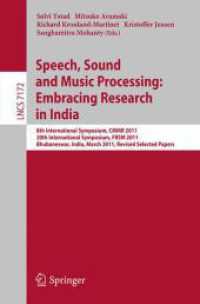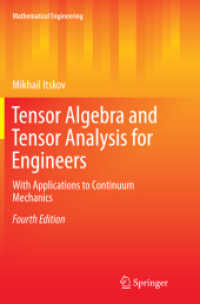Full Description
Learn to assess and assure the quality of university-level distance education classes!
Now that many colleges and universities have embarked on significant distance education curricula, an overview of the state of the art is necessary. This valuable collection looks at distance education through a varied set of critical lenses to examine how distance education classrooms can affect students' attitudes and behaviors, the use of—and attitudes toward—group projects in online courses, the effects that the use of technology has on the relationship between student and teacher, and a great deal more!
Distance Education: Issues and Concerns:
provides concrete recommendations for enhancing the distance education experience
shows the relationship between learning styles, enrollment, and retention in Internet-based courses, and makes recommendations to help ensure student success
highlights the importance of conducting small-scale usability studies for instructional Web sites
examines the advantages of using handheld computers and mobile phones in teacher education
emphasizes the importance of good teaching, no matter what kind of technology is in use
provides an overview of the drawbacks and benefits of distance education and a plan for quality control
examines the steps taken by one graduate program to ensure continuing improvement of its online courses
offers a number of ways to develop a comprehensive quality control system that addresses development, delivery, and evaluation
presents a basic cost-income model for electronically delivered instruction
provides a social constructionist framework for online learning
looks at the challenges that laboratory experience courses present in a distance education context, and shows how remote lab use could work in several engineering disciplines
describes a successful hybrid online graduate class designed to help administrators increase their technical competencies
and more!
Contents
Introduction, The Light and the Dark Sides of Distance Education, RESEARCH ARTICLES, Adapting to Distance Education: How an Ethnographic Look at Student Experiences Can Inform Instruction Design, An Investigation of Methods of Instruction and Student Learning Styles in Internet-Based Community College Courses, Usability of Alternative Web Course Structures, Mobile Wireless Technologies for Field-Based Teacher Interns and Their Partnership Teachers, The Use of Collaborative Groups in Traditional and Online Courses, Multimedia, It's How You Use It: Reflections on a Selected Computerized Teaching Technology, GENERAL ARTICLES, Striving for Quality Control in Distance Education, Quality Control for Online Graduate Course Delivery: A Case Study, Cost-Income Equilibrium for Electronically Delivered Instruction, Distance Education as a Discursive Practice: Voice, Discourse, and Pedagogy, Quality Control in Online Courses: Using a Social Constructivist Framework, Distance Realities: Rural Wisdom, Remote Labs: The Next High-Tech Step Beyond Simulation for Distance Education, Hybrid Online Coursework to Enhance Technology Competencies of School Principals, The Contributing Student: A Pedagogy for Flexible Learning, Index, Reference Notes Included ,








